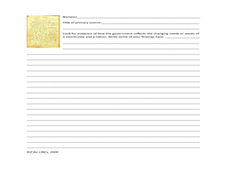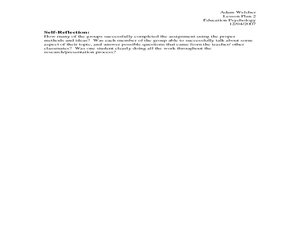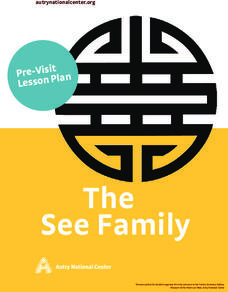New York State Education Department
Global History and Geography Examination: June 2010
Using a set of primary source documents, such as descriptions of climate phenomena and images of weather events, pupils consider how climate shapes history. A second essay prompt and multiple-choice questions with documents engage...
National Woman's History Museum
Helen Keller--Citizen and Socialist
Do history books tell the full story of Helen Keller? The sanitized version of Helen Keller found in most textbooks leaves out her most provocative ideas. She was a socialist, fought for workers' rights, and advocated for the use of...
Facebook
Versions of Media Texts
Verification of provenance and the original source of an image or video can be a long and winding process. Young journalists learn about the difficulty of finding the original source of a scrape, a copy of an original news story, and...
Curated OER
Towards Separation of Church and State in Gloucester
Explore New England government in the 1700's with your class. They will identify historical documents as primary or secondary sources, then read and discuss the significance of these documents as they relate to the "freedom of religion"...
University of North Carolina
History
The past helps to inform the present and the future—that's why the study of history is so important. The handout describes what historians do and why their jobs are meaningful. Readers learn about what to expect in a college-level...
Curated OER
Primary and Secondary source Indiana event activity
Students research facts about Indiana's history. In this state history instructional activity, students use primary and secondary sources to research significant events from Indiana's history. They work in small groups to create a class...
Curated OER
Images from South Carolina Cotton Mills
Fifth graders write a paragraph comparing their lives to the lives of a child working in South Carolina during the early 1900's. In this Industrial Revolution lesson plan, 5th graders explore primary and secondary sources to teach them...
Curated OER
Analyzing Primary and Secondary Sources to Assess the Decisions and Policies of Sitting Bull, Red Cloud, and the U.S. Government
Learners examine U.S. policies regarding Native Americans. In this Native American history instructional activity, students analyze provided primary and secondary sources concerning Red Cloud, Sitting Bull, and the Dawes Act. Learners...
Curated OER
Primary/Secondary Source Activity
In this primary/secondary source worksheet, students answer a set of 5 questions about a picture drawn in approximately 1934 of an event that took place in 1867.
Curated OER
Primary or Secondary Source?
In this primary and secondary sources worksheet, students look at a picture of colonial trapper, then answer 6 questions about source and specifics of the picture.
National Woman's History Museum
Sally Hemings: Raising a Family Amidst the Brutality of Slavery
Pupils may know about early American figures such as Phyllis Wheatley and Abigail Adams, but what about Sally Hemings? Sally Hemings was the mother of Thomas Jefferson's children, but she is often left in the shadows of history....
Curated OER
Writing a Literary Analysis
What makes writing literary? What comprises analysis? A 15-slide PowerPoint presentation, created by the Purdue University Writing Lab, tackles these questions. The explanations of what makes writing literary and what comprises analysis...
Curated OER
Sources of Information
In this sources of information study guide worksheet, students read a brief overview pertaining primary and secondary sources and then respond to a reflection question.
Wells Fargo
Wells Fargo History Museum: Curriculum Guide
Learn about the California Gold Rush from an institution that has been in place since the early days of the American West: Wells Fargo History Museum. From domain-specific vocabulary review to group research projects, an expansive packet...
National Endowment for the Humanities
Using Historic Digital Newspapers for National History Day
Your learners will take a trip through history as they peruse through historic digitalized newspapers, reading real articles from such historical periods in the United States as the Temperance movement and passage of the Thirteenth...
DocsTeach
Benjamin Franklin: Politician and Diplomat
Benjamin Franklin was many things: a scientist, businessman, diplomat, politician. Learners explore facets of the legendary figure with a matching activity. By matching primary source documents to their descriptions, they analyze the...
Curated OER
The See Family
Third graders examine photographs as primary source documents. Students are broken into groups and are given photographs of the See Family.
Curated OER
1960 America: Foreign Policy
The 1960's marked shifts in American culture, politics, and policy. Your class groups up to research a series of primary source documents resulting in a timeline and a 15 minute oral presentation. Active learning all the way.
Center for History Education
To What Extent Were Women's Contributions to World War II Industries Valued?
Women rose to the challenge when the nation's war effort called them—but were sent home when the GIs came back from World War II. Young historians consider whether the United States valued women's contributions during the war using a...
Curated OER
Liberty Rhetoric
What is liberty rhetoric? Examine how people have used it in four different time periods and situations. High schoolers investigate original source documents and compare them with the Declaration of Independence to decide how liberty...
EngageNY
Connecting Ideas in Primary and Secondary Sources: What Led to the Attack on Pearl Harbor?
Let's make some sense of those thoughts! Scholars continue thinking about the different perspectives on Pearl Harbor. They analyze quotes from War in the Pacific, Day of Infamy, and Fourteen-Part Message. Readers tape each quote to chart...
National Park Service
Freedom at Antietam
Explore how the issuance of the Emancipation Proclamation affected everyday individuals in the Civil War era. Learners are given the opportunity to read and evaluate primary and secondary source material, and then to compose a writing...
Curated OER
Confino Primary Source Activity Lesson Plan
Students examine methods of accounting for historical events. In this local history lesson, students use primary sources to explore the story of a tenement house family in New York. Students discuss the sources they encounter as they...
Curated OER
Holes
Students distinguish between primary and secondary sources when researching on the Internet and evaluating historical records. They recognize important features of a primary source such as the type of document, who created it, what is...
Other popular searches
- Primary and Secondary Sources
- Primary Secondary Sources
- Primary vs Secondary Sources
- Primary & Secondary Sources
- Primary, Secondary Sources
- Teaching Secondary Sources
- Primary vs. Secondary Sources

























